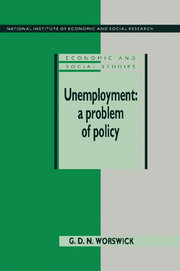Book contents
- Frontmatter
- Contents
- List of tables
- List of charts
- Preface
- 1 INTRODUCTION
- 2 CONCEPTS AND MEASUREMENTS
- PART 1 STRUCTURAL CHANGE
- 3 TECHNOLOGY AND EMPLOYMENT
- 4 THE IMPACT OF INFORMATION TECHNOLOGY
- 5 STRUCTURAL UNEMPLOYMENT
- 6 THE REGIONAL PROBLEM
- 7 WHO WILL PROVIDE THE JOBS?
- PART 2 THE WAGE QUESTION
- PART 3 MACROECONOMIC POLICY
- PART 4 INTERNATIONAL DIMENSION
- Appendix to Chapter 8: The puzzle of the apparent fall in United States real wages
- Notes
- List of works cited
- Index
- THE NATIONAL INSTITUTE OF ECONOMIC AND SOCIAL RESEARCH PUBLICATIONS IN PRINT
7 - WHO WILL PROVIDE THE JOBS?
from PART 1 - STRUCTURAL CHANGE
Published online by Cambridge University Press: 06 July 2010
- Frontmatter
- Contents
- List of tables
- List of charts
- Preface
- 1 INTRODUCTION
- 2 CONCEPTS AND MEASUREMENTS
- PART 1 STRUCTURAL CHANGE
- 3 TECHNOLOGY AND EMPLOYMENT
- 4 THE IMPACT OF INFORMATION TECHNOLOGY
- 5 STRUCTURAL UNEMPLOYMENT
- 6 THE REGIONAL PROBLEM
- 7 WHO WILL PROVIDE THE JOBS?
- PART 2 THE WAGE QUESTION
- PART 3 MACROECONOMIC POLICY
- PART 4 INTERNATIONAL DIMENSION
- Appendix to Chapter 8: The puzzle of the apparent fall in United States real wages
- Notes
- List of works cited
- Index
- THE NATIONAL INSTITUTE OF ECONOMIC AND SOCIAL RESEARCH PUBLICATIONS IN PRINT
Summary
INTRODUCTION
If there is to be any increase in employment, there must be employers to provide the jobs, taking into account, of course, those who employ themselves. In this chapter we explore some of the possibilities. This is bound to be an uneven and speculative exercise, since the amount of information about various sectors of the economy differs considerably. For instance, we know more about manufacturing than about most other sectors, but nowadays manufacturing provides less than a quarter of total employment. Moreover, trends in manufacturing have been untypical, so that we must be careful about generalisations derived from this sector alone.
There are two issues we want particularly to examine, the one-fashionable and the other not. The fashionable one is the idea that small enterprise has a particularly important role to play in the recovery of employment. The unfashionable one is that government might act as a kind of employer of last resort. Public works of course are not a new idea. They were much discussed in the early years of this century as a means of alleviating unemployment, and one suspects that the employment consideration may have been a significant element in more recent demands for expenditure on the infrastructure. But there have also been experiments with various forms of ‘workfare’ which should be looked at.
- Type
- Chapter
- Information
- Unemployment: A Problem of PolicyAnalysis of British Experience and Prospects, pp. 62 - 76Publisher: Cambridge University PressPrint publication year: 1991

